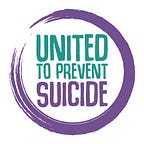Seonaid’s Story
Suicide is preventable if we all take the time to be part of the solution.
Our son Dylan died by suicide in October 2015, he was 18 years old. I remember the moment we received the news as though it were yesterday. How could this have happened?
The days and weeks that followed were a blur as we tried to come to terms with losing Dylan. There was no offer of practical or emotional support to help us handle the complexities which follow a death by suicide, and we muddled through the next weeks with the help of family and close friends. We supported each other as best we could through our shock and grief, until three weeks later my sister-in-law Vanessa also took her life.
More than five years later I still ask, how could this have happened? What might have made a difference? What should we be doing now to prevent this happening to other young people and families like ours?
The reasons behind suicide are varied and complex and so our approaches to suicide prevention will be varied too. New strategies like the Suicide Bereavement Support pilots in Ayrshire and Arran and the Highlands will hopefully prevent families like ours from further tragedy. However, there is one simple thing that we can all do that could make a difference. Talk!
Few people knew that Dylan suffered from Body Dysmorphic Disorder, a disabling anxiety disorder in which sufferers obsess about perceived defects in their appearance. The illness had crept up slowly during his teens. An astonishing 75% of mental health conditions start before the age of 18, but like Dylan’s can go unnoticed and unchecked for too long. Dylan had never learned about mental health or ill health or heard of Body Dysmorphic disorder and social anxiety. He didn’t understand when his thoughts and feelings were becoming unhealthy, and he didn’t have a language to describe how he was feeling or to ask for help. By the time he did ask he was already very ill.
We need to talk more to young people about their mental health. We need to equip our young people with a vocabulary and understanding that will allow them to talk about their challenges and know when and how to ask for help.
Dylan was embarrassed and ashamed by his illness. He didn’t want anyone outside of our family to know how much he struggled with everyday things. At its worst, just leaving the house would cause him devastating distress, social situations were unbearable and concentrating in school was almost impossible as he battled with his intrusive thoughts and feelings. No one was aware of his silent and lonely battle and the incredible energy and strength it took him to turn up and get through each and every day. He desperately wanted to appear like everyone else, ‘normal.’
Respecting Dylan’s wishes seemed like the right thing to do as we didn’t want to cause him any further stress. We put our trust in the care and treatment that he was receiving. In hindsight by keeping things to ourselves we were unwittingly reaffirming his shame and reinforcing the stigma of mental health. I wish we had been able to talk more about what was happening to us all. I wish we had encouraged Dylan to talk to his close friends and share his struggle. I wish it hadn’t been his secret. Would we have done the same if he had been suffering from a physical illness?
So why do we find it so difficult to start a conversation with someone about their mental health or to talk openly about suicide? For most of us, I think it is fear of getting it wrong or making things worse. ‘I’m not a professional.’ But you don’t need to be an expert to notice that your friend’s behaviours have changed, to ask a colleague, ‘are you ok?’, to be compassionate and listen without judgement. You only have to know how to start the conversation.
Suicide is not a single moment in time, it is a journey. But it is a journey that we can stop by knowing how to start that conversation. It is impossible to watch over our loved ones every minute of the day and we don’t always see behaviours and signs that colleagues or friends might see. And for someone struggling with their mental health or suicidal thoughts, it can be impossible to find the words to ask for help. So, consider being part of a community who know how to talk about mental health and suicide.
Suicide is preventable if we all take the time to be part of the solution. Together we can save lives. Let’s talk about mental health and suicide!
The following services offer confidential support from trained staff and volunteers. You can talk about anything that is troubling you, no matter how difficult:
- Call 116 123 to talk to Samaritans, or email jo@samaritans.org. Samaritans are there to listen 24 hours a day, 365 days a year, and it’s always free to call from any landline or mobile phone.
- Call 111 to talk to NHS 24’s mental health hub.
- Call 0800 83 85 87 to talk to Breathing Space. The service is open 24 hours at weekends (6pm Friday — 6am Monday) and 6pm to 2am on weekdays (Monday — Thursday).
- Text “SHOUT” to 85258 to contact the Shout Crisis Text Line, text “YM” if you are under 19.
